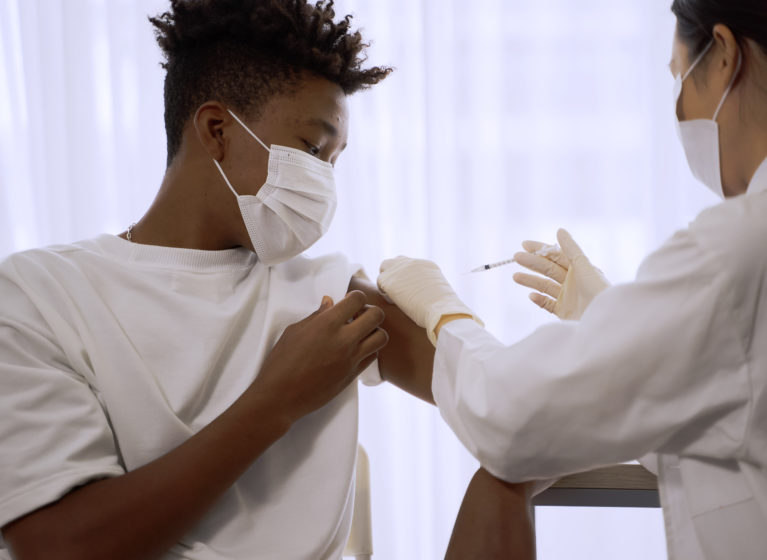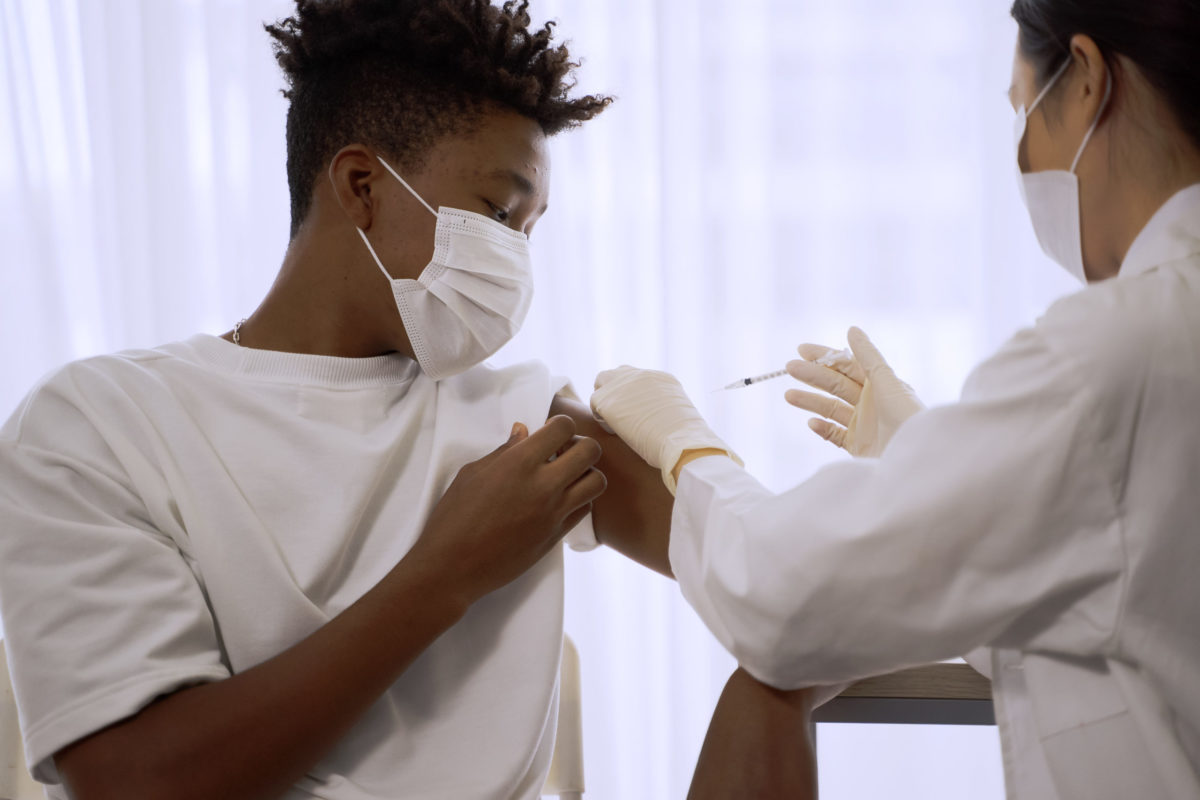

With the continued evolution of the COVID-19 virus comes new information on testing, vaccination and treatment. UVA infectious disease specialists Patrick Jackson, MD, and Debbie-Ann Shirley, MD, provide helpful updates on these important topics and more in the Q&A below.
What is the current status of COVID-19 cases at UVA Health?
[Dr. Jackson] We’re seeing a significant increase in patients hospitalized with COVID-19. It’s not back to the levels we saw in January or February, but there has been an upswing compared to the low number of cases we had in early May and June. Of these patients hospitalized, quite a few have severe disease and almost all are unvaccinated.
How is the delta variant different?
[Dr. Jackson] Delta is significantly more transmissible than previous variants. The reasons for that are not entirely clear. One possibility is that people who are infected with delta make more virus in their respiratory passages, so when they cough or sneeze around others, it’s easier to transmit to other people.
We’re seeing more people getting infected — people who had managed to avoid getting infected earlier in pandemic who are unvaccinated. However, there is no good data suggesting that delta is more deadly than other variants. And we don’t have data that shows the treatments for delta are less effective.
Are there other COVID-19 variants circulating as well?
[Dr. Jackson] There are other variants, but delta is so transmissible that it has outcompeted other variants. So 90% of what we’re seeing in the U.S. is delta. That’s the case for now and there’s no reason to suspect that delta is a plateau in terms of what COVID can accomplish. I would not be shocked to see the next variant come up and replace delta in the future, but delta has shown it’s a more evolutionary-fit virus than previous ones.
We're hearing a lot about the increase in COVID-19 cases among children. Do we know why the delta variant is impacting more kids?
[Dr. Shirley] Cases among children have been increasing since the beginning of July. Delta is the most contagious variant we have seen emerge so far, and since much of the pediatric population remains unvaccinated, they are vulnerable to infection. Children younger than 12 years old are not yet eligible to be vaccinated, and only about half of eligible adolescents over the age of 12 years have received their first dose of the COVID vaccine.
Does COVID-19 present differently in children? What signs should providers be looking out for that they may not be aware of?
[Dr. Shirley] The symptoms of COVID-19 in children are similar to adults, and can look just like a cold or flu illness. Children can have symptoms such as a runny nose, congestion, sore throat, cough, fever and headache. They can sometimes have loss of taste or loss of smell or vomiting and diarrhea. Children may be more tired or not eat as well. More rarely, COVID can cause rashes, red eye, or neurologic complaints.
While serious disease in children is uncommon, it does occur. We are still trying to understand whether the delta variant is more severe in children.
Since it is hard to distinguish COVID-19 from other common viral infections, every child with upper respiratory or other symptoms of COVID-19 should get tested. Providers should also consider the rare multisystem inflammatory disorder can that arise in children following COVID-19.
Should doctors consider giving the COVID-19 vaccine to children under 12 now that Pfizer vaccine has been fully approved by the FDA?
[Dr. Shirley] Vaccine trials in younger children are under way and we eagerly hope to see some of this data start to come out soon. In the meantime, both the FDA and CDC strongly discourage the off-label use of COVID-19 vaccines in children under 12 years of age without understanding the dosing and safety data first. We can’t assume that kids are just little adults in this case. For eligible children over 12 years old, COVID vaccination is strongly recommended.
Is UVA doing anything differently to address this surge compared to earlier in the year?
[Dr. Jackson] We are taking advantage of the treatments available based on new data. We have been more aggressive using monoclonal antibodies, particularly for those vulnerable patients in our transplant clinics or oncology clinics to keep them out of the hospital as much as possible. We’ve been more successful at doing that. In inpatient management, I think we have been more aggressive in providing immune-modulating treatments for those patients who are getting worse more quickly. These shifts in care are based on emerging data. As the pandemic has progressed, a lot of studies have come out. We are continuously reading those and updating our treatment protocols and keeping abreast of the most recent data about the newest treatments for patients.
Which patients are eligible for monoclonal antibody treatment?
[Dr. Jackson] There are some monoclonal antibody therapies available at UVA that are authorized by the FDA [U.S. Food and Drug Administration] for emergency use. These are authorized for early treatment of outpatients with COVID-19. Or, in some cases, it may be offered as post-exposure prophylaxis.
Eligible patients include those who are early on in their symptom course for COVID-19. They should be within 10 days of symptom onset, test positive and be high risk for disease progression. Considerations include age, obesity and other comorbidities like diabetes. These patients may be eligible for infusion or injection with monoclonal antibodies, which have been shown to reduce the risk for hospitalization and death from COVID-19.
Providers within UVA can page me to discuss treatment options. Outside providers can go to uvahealth.com/antibody19 and submit a referral form to get people into our COVID clinic.
If a vaccinated — or previously infected — patient presents with symptoms consistent with a COVID-19 infection, what would you advise referring providers in terms of testing these patients?
I think testing early and often of someone who has symptoms consistent with COVID-19 makes sense. It makes sense in terms of treatment. Those at risk for disease progression may benefit from monoclonal antibodies. That treatment can be helpful, and it is something we offer for those who have been vaccinated; that’s not a contraindication. It’s also helpful from a public health standpoint. Even if it’s a breakthrough case and the patient has been vaccinated, they should still isolate so that they don’t continue to spread the virus from person to person.
Testing patients who had a prior COVID-19 infection requires careful consideration to determine whether the symptoms they’re experiencing are consistent with new COVID or a run-of-the-mill condition like a COPD exasperation or asthma, something unrelated to COVID-19.
It can be challenging to distinguish between a new infection and someone who was exposed weeks or months ago and is now recovered. Our PCR test looks for the presence of viral mRNA in respiratory passages. But we know people who have recovered from natural COVID-19 infection can have that mRNA still shedding for weeks or months after. It’s not live virus, but it makes it hard to distinguish between what’s new and what’s old.
It requires a fair amount of clinical judgement to determine what’s really going on. Part of that is evaluating the symptoms, how long they’ve had them and whether they’re consistent with a new COVID infection. And part of that is getting a clear medical history from the patient, whether they are immune compromised and might be more at risk for a breakthrough infection.
Some additional testing can be done to look at antibody levels and things along those lines, but that takes more sophistication to interpret. Something I help out with on the hospital side is teasing out whether the patient is really back in with a second or third round of COVID or if they’re recovered, but have a new disease process that needs to be treated a different way. It’s a complicated issue and one that is increasingly of concern to try to figure out.
What do we know about the COVID-19 vaccine booster or third shot?
[Dr. Jackson] The third shot is currently being rolled out at UVA for people who are significantly immune compromised. There’s a list of qualifying conditions endorsed by the Advisory Committee for Immunization Practices or ACIP. This is not a huge group of patients, but an important one because they are at greater risk for breakthrough cases and we think a third dose will be effective to keep them healthy. This includes those patients who have had transplants or those on chemo or immune-modulating therapies. Patients should discuss with their primary care doctor or specialist whether they would benefit from a third vaccine.
The announcement from the administration about rolling out a booster to the general population is more challenging. The guidance that has been suggested is that, starting in late September, people who are eight months from their second dose of a mRNA vaccine are eligible for the third dose.
However, at UVA, we are carefully evaluating data and are waiting on more guidance from scientific bodies, including the ACIP and our own experts, about whether and how that suggestion for a third dose will end up being rolled out.
What resources do you recommend for the most current information on COVID-19?
[Dr. Jackson] For the most current and accurate information, the Centers for Disease Control and Prevention (CDC) website is very helpful. The Infectious Disease Society of America has a lot of good patient-facing information.
To learn more about UVA’s COVID-19 response, visit the UVA Health Newsroom.
To refer a patient to UVA Health, call UVA Physician Direct at 800.552.3723.